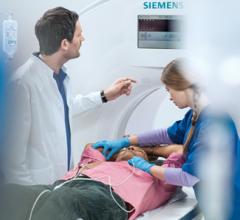If you enjoy this content, please share it with a colleague
RELATED CONTENT
For some early-stage breast cancer patients, accelerated partial breast irradiation (APBI) using multicatheter brachytherapy following breast conserving surgery may be an excellent treatment option. In new research presented at the American Society for Radiation Oncology’s (ASTRO’s) 57th annual meeting, APBI was proven to be as effective as the current standard treatment – whole breast irradiation (WBI) – in local control, disease-free and overall survival rates.
For some patients with human papilloma virus (HPV)-related cancer of the tonsils and tongue, reduced intensity radiation therapy (RT) and chemotherapy may be as effective as standard-dose radiation and chemotherapy, and result in less acute side effects. This conclusion came from research presented at the American Society for Radiation Oncology’s (ASTRO’s) 57th annual meeting, Oct. 18-21 in San Antonio.
A prospective study of guideline-based postoperative image-guided intensity modulated radiation therapy (IG-IMRT) in prostate cancer patients found toxicity profiles low and patient-reported quality of life following treatment favorable. Researchers concluded that toxicity and health-related quality of life (HRQOL) should not impact the recommendation of radiation therapy treatment following prostatectomy.
October 2, 2015 — The American Society for Radiation Oncology (ASTRO) applauded the members of Congress who signed ...
The American Society for Radiation Oncology’s (ASTRO’s) 57th annual meeting will be held at the Henry B. González Convention Center, Oct.18-21, 2015, in San Antonio.
The American Society for Radiation Oncology (ASTRO) has selected seven leading physician-researchers to receive a total ...
The American Society of Radiation Oncology (ASTRO) has raised concerns about proposed additional payment cuts to radiation therapy in the proposed Medicare Physician Fee Schedule (MPFS) for 2016, released July 8, 2015. All changes would take effect on Jan. 1, 2016.
Phase III results of Radiation Therapy Oncology Group (RTOG) 0537 indicate that acupuncture-like, transcutaneous electrical nerve stimulation (ALTENS) may be equally effective as pilocarpine to treat radiation-induced xerostomia (dry mouth). Study results were published in the June 1, 2015 issue of the International Journal of Radiation Oncology • Biology • Physics (Red Journal), the official scientific journal of the American Society for Radiation Oncology (ASTRO). RTOG 0537 is a phase II/III, multi-center, randomized trial comparing ALTENS with pilocarpine, which is the current standard of treatment for radiation-induced xerostomia.
The American Society for Radiation Oncology (ASTRO) is issuing a new guideline, “Definitive and adjuvant radiotherapy in locally advanced non-small cell lung cancer: An American Society for Radiation Oncology (ASTRO) evidence-based clinical practice guideline.” The guideline’s executive summary is published in the May-June issue of Practical Radiation Oncology (PRO), ASTRO’s clinical practice journal. The complete guideline, which cites 35 years of data to help guide current treatment and future research, is available online as an open-access article in PRO. The American Society of Clinical Oncology (ASCO) issued an endorsement of ASTRO’s guideline.
The “Radiation and the Modern Management of Lymphoma” issue (May 1, 2015) of the International Journal of Radiation Oncology • Biology • Physics (Red Journal) is focused on the integral role of radiation therapy in current lymphoma treatment. The Red Journal is the official scientific journal of the American Society for Radiation Oncology (ASTRO).


 October 19, 2015
October 19, 2015 






